Friday 27 January 2012 (07.00 am)
Watford v Tottenham Hotspur (7.45 pm)
Everton v Fulham (8.00 pm)
 When the 2011/12 FA Cup Fourth Round begins on Friday night there will be two fixtures taking place. The first of these will see Watford take on Spurs at Vicarage Road. These two sides have met on four previous occasions in the FA Cup and Spurs have triumphed in all of them. Interestingly, the first two ever games between these clubs took place in the FA Cup. In January 1922 in the Second Round, Tottenham triumphed 1-0 at White Hart Lane and in 1939 an emphatic 7-1 win for Spurs in the Third Round. The most famous of the FA Cup meetings came in the 1986/87 season when the teams met in a Semi-Final tie at Villa Park. Tottenham finished comfortable 4-1 winners with Steve Hodge bagging a brace to add to goals from Clive Allen and Paul Allen. Malcolm Allen scored The Hornets goal. The last meeting between these team came in the Third Round in 1999 at Spurs, with the home side convincing 5-2 winners.
When the 2011/12 FA Cup Fourth Round begins on Friday night there will be two fixtures taking place. The first of these will see Watford take on Spurs at Vicarage Road. These two sides have met on four previous occasions in the FA Cup and Spurs have triumphed in all of them. Interestingly, the first two ever games between these clubs took place in the FA Cup. In January 1922 in the Second Round, Tottenham triumphed 1-0 at White Hart Lane and in 1939 an emphatic 7-1 win for Spurs in the Third Round. The most famous of the FA Cup meetings came in the 1986/87 season when the teams met in a Semi-Final tie at Villa Park. Tottenham finished comfortable 4-1 winners with Steve Hodge bagging a brace to add to goals from Clive Allen and Paul Allen. Malcolm Allen scored The Hornets goal. The last meeting between these team came in the Third Round in 1999 at Spurs, with the home side convincing 5-2 winners.
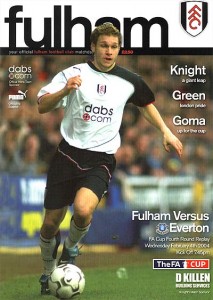 The other game will see Fulham travel to Goodison Park to take on Everton. For Fulham fans of a certain age this fixture will bring back memories of the Fifth Round tie that took place back in February 1975. A game which pitched then Second Division Fulham against the First Division leaders. It was to be an epic game that was part of an incredible 11 game journey by the men from Craven Cottage that took them to the 1975 FA Cup Final against West Ham United. Coincidentally, as was the case with Watford v Tottenham, the first two occasions Everton and Fulham met was also in the FA Cup. Everton first hosted Fulham in January 1926 in the Third Round. After a draw at Goodison, Fulham won the replay 1-0. It was over twenty years before these two clashed again, and on this occasion it was a Fifth Round tie in London in 1948. The game went to a replay and Fulham emerged 1-0 winners. In February 1975 and again at the Fifth Round stage, Fulham travelled to the North West and came away with a 2-1 victory courtesy of two Viv Busby goals. The last meeting was in the Fourth Round in 2004. The game at Goodison looked to be slipping away from Everton as they were behind 1-0 to a Sean Davis goal. However, in the dying minutes Francis Jeffers scored to ensure a replay. As in the first game Everton went behind and again Jeffers equalised in the dying minutes. However, Steed Malbranque was the Fulham hero as he scored to sent The Cottagers through 2-1.
The other game will see Fulham travel to Goodison Park to take on Everton. For Fulham fans of a certain age this fixture will bring back memories of the Fifth Round tie that took place back in February 1975. A game which pitched then Second Division Fulham against the First Division leaders. It was to be an epic game that was part of an incredible 11 game journey by the men from Craven Cottage that took them to the 1975 FA Cup Final against West Ham United. Coincidentally, as was the case with Watford v Tottenham, the first two occasions Everton and Fulham met was also in the FA Cup. Everton first hosted Fulham in January 1926 in the Third Round. After a draw at Goodison, Fulham won the replay 1-0. It was over twenty years before these two clashed again, and on this occasion it was a Fifth Round tie in London in 1948. The game went to a replay and Fulham emerged 1-0 winners. In February 1975 and again at the Fifth Round stage, Fulham travelled to the North West and came away with a 2-1 victory courtesy of two Viv Busby goals. The last meeting was in the Fourth Round in 2004. The game at Goodison looked to be slipping away from Everton as they were behind 1-0 to a Sean Davis goal. However, in the dying minutes Francis Jeffers scored to ensure a replay. As in the first game Everton went behind and again Jeffers equalised in the dying minutes. However, Steed Malbranque was the Fulham hero as he scored to sent The Cottagers through 2-1.
Tonight then, two games where FA Cup history says that the winners will be Tottenham and Fulham. If only it were that simple.
Friday 27 January 2012 (11.00 pm)
Watford (0) – (1) Tottenham Hotspur
Everton (2) – (1) Fulham
Abba famously sang in their hit “Waterloo”, “…The history book on the shelf, Is always repeating itself…” Now, fine exponents of the pop song they may have been, but as for football pundits, well, the jury has to be out tonight. History said Tottenham hadn’t lost to Watford in the Cup and so it continued as Spurs came away from Vicarage Road with a 1-0 win. Rafael van der Vaart’s long range effort just before half-time gave Spurs the lead, but The Hornets provided their Premier League opponents with a real test in the second period. After the game Spurs manager Harry Redknapp acknowledged that his team had indeed ridden their luck to make it through to the Fifth Round. Unfortunately for Watford it was a case of “So Long” to this years competition.
Meanwhile on Merseyside, Fulham were at Goodison with their unbeaten FA Cup record over Everton at stake. It all looked good for The Cottagers when they went ahead through a Danny Murphy penalty. However, The Toffees worked their way back into the game and were level before the half-hour mark. Everton emerged the better side in the second-half and a header from Marouane Fellaini ensured their progress and Fulham’s exit.
“Hasta Manana”
Saturday 28 January 2012 (10:00 am)
Sheffield United v Birmingham City
It’s a case of back to Bramall Lane for the ‘trail’ game later today. January has been a mixed month in the League for The Blades, with two convincing wins, against Yeovil and Bury, offset by two losses to Carlisle United and last weekend at League leaders Charlton. Birmingham have gone unbeaten this month, drawing with Peterborough (1-1), followed by wins against Ipswich (2-1), Millwall (6-0) and Watford (3-0). Both clubs have to date had good seasons and they both occupy a play-off place in their respective divisions.
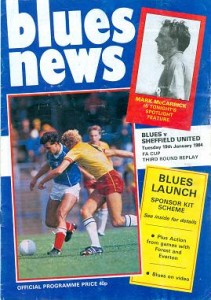 In terms of the FA Cup, this will be The Blades fourth tie this season and in the last round Sheffield United put an end to non-league Salisbury City’s adventure 3-1, whilst Birmingham put out Midlands rivals 1-0 in a replay at Molineux. These clubs have met previously in the FA Cup on three occasions and on each occasion Birmingham City have emerged as winners. The Blues won 2-1 in 1933/34, 3-1 after a replay in 1952/53, with the most recent tie in the 1983/84 season. In a Third Round tie at Bramall Lane, then Third Division Sheffield United held First Division Birmingham City to a 1-1 draw, before The Blues emerged 2-0 winners in the replay.
In terms of the FA Cup, this will be The Blades fourth tie this season and in the last round Sheffield United put an end to non-league Salisbury City’s adventure 3-1, whilst Birmingham put out Midlands rivals 1-0 in a replay at Molineux. These clubs have met previously in the FA Cup on three occasions and on each occasion Birmingham City have emerged as winners. The Blues won 2-1 in 1933/34, 3-1 after a replay in 1952/53, with the most recent tie in the 1983/84 season. In a Third Round tie at Bramall Lane, then Third Division Sheffield United held First Division Birmingham City to a 1-1 draw, before The Blues emerged 2-0 winners in the replay.
This is The Blades toughest test in the Cup this season and will be a good chance to compare themselves against Championship opposition.
Saturday 28 January 2012 (07:00 pm)
Sheffield United (0) – (4) Birmingham City
 The Blades FA Cup run came to an emphatic end at the hands of Birmingham City today. To an extent the score-line doesn’t reflect the part United played in this game, although they did at times contribute to their own downfall today. The Blades opened the game very positively and dominated the opening fifteen minutes. Ched Evans, Lee Williamson and Stephen Quinn were causing problems for Birmingham and with over 18,000 in the ground their was a terrific atmosphere inside Bramall Lane. However, with their first corner of the game, Nathan Redmond was picked out and his shot flashed into the net to give The Blues a lead against the run of play. Birmingham suddenly looked a different side, who seemed first to every loose ball and eager for more goals. The Blades were now playing far deeper and allowed The Blues space in midfield. On a couple of occasions Redmond drove at the United defence, but shot wastefully wide. Chris Burke too was coming more into the game and getting dangerously down the flanks. On 38 minutes Burke was involved in getting wide again and his cross was efficiently swept past Simonsen by Adam Rooney to put City 2-0 up, as they cruised towards half-time.
The Blades FA Cup run came to an emphatic end at the hands of Birmingham City today. To an extent the score-line doesn’t reflect the part United played in this game, although they did at times contribute to their own downfall today. The Blades opened the game very positively and dominated the opening fifteen minutes. Ched Evans, Lee Williamson and Stephen Quinn were causing problems for Birmingham and with over 18,000 in the ground their was a terrific atmosphere inside Bramall Lane. However, with their first corner of the game, Nathan Redmond was picked out and his shot flashed into the net to give The Blues a lead against the run of play. Birmingham suddenly looked a different side, who seemed first to every loose ball and eager for more goals. The Blades were now playing far deeper and allowed The Blues space in midfield. On a couple of occasions Redmond drove at the United defence, but shot wastefully wide. Chris Burke too was coming more into the game and getting dangerously down the flanks. On 38 minutes Burke was involved in getting wide again and his cross was efficiently swept past Simonsen by Adam Rooney to put City 2-0 up, as they cruised towards half-time.
The Blades were first out the blocks in the second-half and dominated the opening ten minutes. Lee Williamson was again a threat to Birmingham as was the experienced Richard Cresswell with a couple of attempts on goal. However, Birmingham weathered the storm, and scored a third on 58 minutes. As they had done in the opening period The Blades backed off and backed off and Wade Elliot took advantage by firing home to put City 3-0 up and send the 4,000 travelling fans delirious. United continued to press, but could find no way past the City custodian Colin Doyle who was to keep a clean-sheet, despite some nervous looking handling all afternoon. With less than fifteen minutes remaining, a period of sustained Birmingham possession saw the ball switched into the six-yard box, where Adam Rooney tucked home his second and a fourth goal for The Blues. As some Blades fans drifted away at the last goal, so the match lost its earlier intensity and after 3 minutes of time added-on the referee blew for time.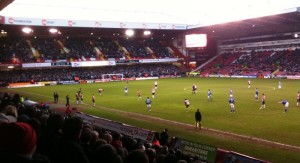
On reflection, United will know they had their periods of pressure, but Birmingham were clinical and scored at crucial times. The Blades were somewhat unfortunate to play Birmingham at this point, as the side from St Andrews are running into a bit of form latterly. Danny Wilson will not have the Cup as a distraction now and instead must look to focus his side and ensure they are ready to battle for promotion. City will look forward to the next round and keep their own chances of promotion on the boil.
I’d like to put on record my thanks to Sheffield United as a club for their pricing policy throughout the FA Cup this year. The total cost for the four games I have seen at Bramall Lane has only been £45 and it has been a privilege to have witnessed the four game adventure. Good luck to The Blades in their promotion push.
Sunday 29 January 2012 (7.00 pm)
Sunderland (1) – (1) Middlesbrough
In the first of the two final games of the Fourth Round, the Wear-Tees derby took place at The Stadium of Light in front of a crowd of over 33,000. It proved to be a no-nonsense game that you would expect from such close Northeast neighbours. The visitors struck first when on 16 minutes, Barry Robson brilliantly gave Boro’ the lead. However, hero turned villain, when Robson gave away possession which lead to a goal for substitute Fraizer Campbell who made a goal-scoring return after 18 months out injured.
Arsenal (3) – (2) Aston Villa
At half-time this game seemed only to be going one way and that was a Cup exit for Arsenal. Villa had gone ahead through Richard Dunne on 33 minutes and were seemingly cruising at 2-0 when Darren Bent scored on the stroke of half-time. However, the game all turned in a frantic seven minute spell. On 54 minutes Aaron Ramsey was brought down by goal-scorer Dunne and from the resulting penalty Robin van Persie gave The Gunners a way back into the game. Three minutes later and the game was all square when Theo Walcott was credited with a scrappy looking goal, not that the Emirates faithful cared. The comeback was complete on 61 minutes, this time the other Villa scorer, Bent conceded the penalty, and Captain Fantastic did the rest from the spot. They always say you need a bit of luck to win the Cup. Arsenal will certainly hope so.

In the remaining “trail” game not covered so far, Bolton Wanderers made it through to the Fifth Round after a 2-1 home win over Swansea City. Luke Moore put the visitors ahead on 43 minutes, but The Swans couldn’t hang on to their lead until the half-time whistle. In time added-on, Darren Pratley headed in from a Martin Petrov free-kick. The game was won on 56 minutes when Gerhard Tremmel, the Swansea reserve keeper couldn’t hold a Petrov shot and Chris Eagles gleefully slotted home the loose ball.
After the draw the Fifth Round “trail” fixtures are as follows:
Everton v Blackpool/Sheffield Wednesday
Chelsea v Birmingham City
Sunderland/Middlesbrough v Arsenal/Aston Villa
Millwall/Southampton v Bolton Wanderers
So Wembley is a step closer and as those football pundits from Abba once said, “…the winner takes it all, the loser has to fall…”
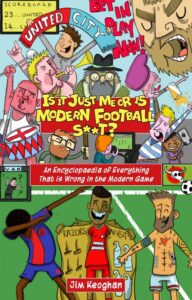 Jim Keoghan is a freelance writer who has for over thirty years been an Everton supporter. He has written three books about his beloved Toffees, Highs, Lows & Bakayokos: Everton in the 1990s, Everton Greatest Games: The Toffees Fifty Finest Matches and Everton: Number Nine: Nine Players, One Iconic Shirt. In addition he has produced two other football titles, Punk Football: The Rise of Fan Ownership in English Football and How to Run a Football Club: The Story of Our National Game.
Jim Keoghan is a freelance writer who has for over thirty years been an Everton supporter. He has written three books about his beloved Toffees, Highs, Lows & Bakayokos: Everton in the 1990s, Everton Greatest Games: The Toffees Fifty Finest Matches and Everton: Number Nine: Nine Players, One Iconic Shirt. In addition he has produced two other football titles, Punk Football: The Rise of Fan Ownership in English Football and How to Run a Football Club: The Story of Our National Game. The European Cup Winners’ Cup (ECWC) competition came into being in the 1960/61 season, and as its title suggests qualification was attained by being the winners of a countries domestic cup. Despite its creation after the first European Cup competition in 1955/56 and the Inter-Cities Fairs Cup which also began in 1955 (before it morphed into the UEFA Cup in 1971/72) and therefore being the youngest of the three competitions, it was though seen as the next most prominent after the European Cup. It continued until the 1998/99 season with the final playing of the tournament between SS Lazio and RCD Mallorca at Villa Park, home of Aston Villa, the last of the 39 Finals.
The European Cup Winners’ Cup (ECWC) competition came into being in the 1960/61 season, and as its title suggests qualification was attained by being the winners of a countries domestic cup. Despite its creation after the first European Cup competition in 1955/56 and the Inter-Cities Fairs Cup which also began in 1955 (before it morphed into the UEFA Cup in 1971/72) and therefore being the youngest of the three competitions, it was though seen as the next most prominent after the European Cup. It continued until the 1998/99 season with the final playing of the tournament between SS Lazio and RCD Mallorca at Villa Park, home of Aston Villa, the last of the 39 Finals.
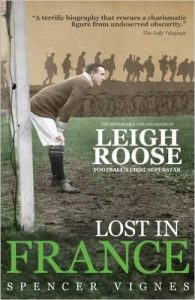 In the modern age football feels like it is at saturation point in terms of coverage. Every detail about a player, manager or club is scrutinised to an infinite degree, so much so that nothing feels new, fresh or indeed inspiring.
In the modern age football feels like it is at saturation point in terms of coverage. Every detail about a player, manager or club is scrutinised to an infinite degree, so much so that nothing feels new, fresh or indeed inspiring.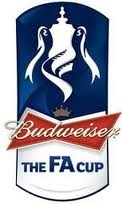
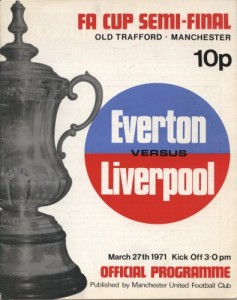 So this weekend the pockets of fans particularly from Liverpool and Everton, and also Chelsea and Spurs, are severely stretched as Merseyside and London derbies take place at Wembley. Everton and Liverpool have meet on four occasions in the FA Cup Semi-Finals. The first meeting was in 1906 at Villa Park, when Everton beat Liverpool 2-0. The Toffees then went on to overcome Newcastle United in the Final. The Reds had to wait until 1950 before the next Semi-Final meeting with Everton. At Maine Road, Liverpool triumphed 2-0, but were unable to overcome Arsenal in the Final. Old Trafford was the venue for the next meeting of the Merseyside giants in 1971. Everton lead at half-time 1-0 thanks to a goal from Alan Ball, however back came Liverpool and goals from Alun Evans and Brian Hall sent the Reds through. However as in 1950, Arsenal were waiting in the Final and as then, The Gunners took the Cup in 1971. The last Semi-Final meeting took place in 1977. It turned out to be a bit of a classic in which Liverpool went ahead twice through goals from Terry McDermott and Jimmy Case, with Everton equalising through Duncan McKenzie and Bruce Rioch. With the game at 2-2 and less than five minutes to go, Everton thought they had won the game when Bryan Hamilton scored, however referee Clive Thomas disallowed it and the replay was more of a formality as goals from Neal, Case and Kennedy saw Liverpool romp to a 3-0 win. The Reds took the League title that year and their first European Cup, but they didn’t add the FA Cup to that list, as Manchester United won 2-1 in the Final.
So this weekend the pockets of fans particularly from Liverpool and Everton, and also Chelsea and Spurs, are severely stretched as Merseyside and London derbies take place at Wembley. Everton and Liverpool have meet on four occasions in the FA Cup Semi-Finals. The first meeting was in 1906 at Villa Park, when Everton beat Liverpool 2-0. The Toffees then went on to overcome Newcastle United in the Final. The Reds had to wait until 1950 before the next Semi-Final meeting with Everton. At Maine Road, Liverpool triumphed 2-0, but were unable to overcome Arsenal in the Final. Old Trafford was the venue for the next meeting of the Merseyside giants in 1971. Everton lead at half-time 1-0 thanks to a goal from Alan Ball, however back came Liverpool and goals from Alun Evans and Brian Hall sent the Reds through. However as in 1950, Arsenal were waiting in the Final and as then, The Gunners took the Cup in 1971. The last Semi-Final meeting took place in 1977. It turned out to be a bit of a classic in which Liverpool went ahead twice through goals from Terry McDermott and Jimmy Case, with Everton equalising through Duncan McKenzie and Bruce Rioch. With the game at 2-2 and less than five minutes to go, Everton thought they had won the game when Bryan Hamilton scored, however referee Clive Thomas disallowed it and the replay was more of a formality as goals from Neal, Case and Kennedy saw Liverpool romp to a 3-0 win. The Reds took the League title that year and their first European Cup, but they didn’t add the FA Cup to that list, as Manchester United won 2-1 in the Final.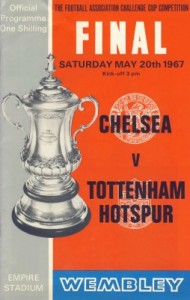 The second Semi-Final takes place on Sunday when North London meets South West London. Chelsea and Spurs have never met in the FA Cup at the Semi-Final stage, although did meet in the 1967 Final when Tottenham emerged winners 2-1. Chelsea have gone through a mini-resurgence under Roberto Di Mattaeo, progressing through to the Champions League Semi-Finals, although they looked a little leg weary in their Easter Monday draw at Fulham and were fortunate with decisions in their 2-1 win over Wigan. Spurs lost at home in their last Premier League outing to Norwich City and the North London club have only won two of their last ten fixtures. Has all the talk of Redknapp’s departure for the England job unsettled Tottenham? They have some talent in their squad, but it’s a bad time to hit a rocky patch as the business end of the season approaches.
The second Semi-Final takes place on Sunday when North London meets South West London. Chelsea and Spurs have never met in the FA Cup at the Semi-Final stage, although did meet in the 1967 Final when Tottenham emerged winners 2-1. Chelsea have gone through a mini-resurgence under Roberto Di Mattaeo, progressing through to the Champions League Semi-Finals, although they looked a little leg weary in their Easter Monday draw at Fulham and were fortunate with decisions in their 2-1 win over Wigan. Spurs lost at home in their last Premier League outing to Norwich City and the North London club have only won two of their last ten fixtures. Has all the talk of Redknapp’s departure for the England job unsettled Tottenham? They have some talent in their squad, but it’s a bad time to hit a rocky patch as the business end of the season approaches. When the 2011/12 FA Cup Fourth Round begins on Friday night there will be two fixtures taking place. The first of these will see Watford take on Spurs at Vicarage Road. These two sides have met on four previous occasions in the FA Cup and Spurs have triumphed in all of them. Interestingly, the first two ever games between these clubs took place in the FA Cup. In January 1922 in the Second Round, Tottenham triumphed 1-0 at White Hart Lane and in 1939 an emphatic 7-1 win for Spurs in the Third Round. The most famous of the FA Cup meetings came in the 1986/87 season when the teams met in a Semi-Final tie at Villa Park. Tottenham finished comfortable 4-1 winners with Steve Hodge bagging a brace to add to goals from Clive Allen and Paul Allen. Malcolm Allen scored The Hornets goal. The last meeting between these team came in the Third Round in 1999 at Spurs, with the home side convincing 5-2 winners.
When the 2011/12 FA Cup Fourth Round begins on Friday night there will be two fixtures taking place. The first of these will see Watford take on Spurs at Vicarage Road. These two sides have met on four previous occasions in the FA Cup and Spurs have triumphed in all of them. Interestingly, the first two ever games between these clubs took place in the FA Cup. In January 1922 in the Second Round, Tottenham triumphed 1-0 at White Hart Lane and in 1939 an emphatic 7-1 win for Spurs in the Third Round. The most famous of the FA Cup meetings came in the 1986/87 season when the teams met in a Semi-Final tie at Villa Park. Tottenham finished comfortable 4-1 winners with Steve Hodge bagging a brace to add to goals from Clive Allen and Paul Allen. Malcolm Allen scored The Hornets goal. The last meeting between these team came in the Third Round in 1999 at Spurs, with the home side convincing 5-2 winners. The other game will see Fulham travel to Goodison Park to take on Everton. For Fulham fans of a certain age this fixture will bring back memories of the Fifth Round tie that took place back in February 1975. A game which pitched then Second Division Fulham against the First Division leaders. It was to be an epic game that was part of an incredible 11 game journey by the men from Craven Cottage that took them to the 1975 FA Cup Final against West Ham United. Coincidentally, as was the case with Watford v Tottenham, the first two occasions Everton and Fulham met was also in the FA Cup. Everton first hosted Fulham in January 1926 in the Third Round. After a draw at Goodison, Fulham won the replay 1-0. It was over twenty years before these two clashed again, and on this occasion it was a Fifth Round tie in London in 1948. The game went to a replay and Fulham emerged 1-0 winners. In February 1975 and again at the Fifth Round stage, Fulham travelled to the North West and came away with a 2-1 victory courtesy of two Viv Busby goals. The last meeting was in the Fourth Round in 2004. The game at Goodison looked to be slipping away from Everton as they were behind 1-0 to a Sean Davis goal. However, in the dying minutes Francis Jeffers scored to ensure a replay. As in the first game Everton went behind and again Jeffers equalised in the dying minutes. However, Steed Malbranque was the Fulham hero as he scored to sent The Cottagers through 2-1.
The other game will see Fulham travel to Goodison Park to take on Everton. For Fulham fans of a certain age this fixture will bring back memories of the Fifth Round tie that took place back in February 1975. A game which pitched then Second Division Fulham against the First Division leaders. It was to be an epic game that was part of an incredible 11 game journey by the men from Craven Cottage that took them to the 1975 FA Cup Final against West Ham United. Coincidentally, as was the case with Watford v Tottenham, the first two occasions Everton and Fulham met was also in the FA Cup. Everton first hosted Fulham in January 1926 in the Third Round. After a draw at Goodison, Fulham won the replay 1-0. It was over twenty years before these two clashed again, and on this occasion it was a Fifth Round tie in London in 1948. The game went to a replay and Fulham emerged 1-0 winners. In February 1975 and again at the Fifth Round stage, Fulham travelled to the North West and came away with a 2-1 victory courtesy of two Viv Busby goals. The last meeting was in the Fourth Round in 2004. The game at Goodison looked to be slipping away from Everton as they were behind 1-0 to a Sean Davis goal. However, in the dying minutes Francis Jeffers scored to ensure a replay. As in the first game Everton went behind and again Jeffers equalised in the dying minutes. However, Steed Malbranque was the Fulham hero as he scored to sent The Cottagers through 2-1.
 In terms of the FA Cup, this will be The Blades fourth tie this season and in the last round Sheffield United put an end to non-league Salisbury City’s adventure 3-1, whilst Birmingham put out Midlands rivals 1-0 in a replay at Molineux. These clubs have met previously in the FA Cup on three occasions and on each occasion Birmingham City have emerged as winners. The Blues won 2-1 in 1933/34, 3-1 after a replay in 1952/53, with the most recent tie in the 1983/84 season. In a Third Round tie at Bramall Lane, then Third Division Sheffield United held First Division Birmingham City to a 1-1 draw, before The Blues emerged 2-0 winners in the replay.
In terms of the FA Cup, this will be The Blades fourth tie this season and in the last round Sheffield United put an end to non-league Salisbury City’s adventure 3-1, whilst Birmingham put out Midlands rivals 1-0 in a replay at Molineux. These clubs have met previously in the FA Cup on three occasions and on each occasion Birmingham City have emerged as winners. The Blues won 2-1 in 1933/34, 3-1 after a replay in 1952/53, with the most recent tie in the 1983/84 season. In a Third Round tie at Bramall Lane, then Third Division Sheffield United held First Division Birmingham City to a 1-1 draw, before The Blues emerged 2-0 winners in the replay. The Blades FA Cup run came to an emphatic end at the hands of Birmingham City today. To an extent the score-line doesn’t reflect the part United played in this game, although they did at times contribute to their own downfall today. The Blades opened the game very positively and dominated the opening fifteen minutes. Ched Evans, Lee Williamson and Stephen Quinn were causing problems for Birmingham and with over 18,000 in the ground their was a terrific atmosphere inside Bramall Lane. However, with their first corner of the game, Nathan Redmond was picked out and his shot flashed into the net to give The Blues a lead against the run of play. Birmingham suddenly looked a different side, who seemed first to every loose ball and eager for more goals. The Blades were now playing far deeper and allowed The Blues space in midfield. On a couple of occasions Redmond drove at the United defence, but shot wastefully wide. Chris Burke too was coming more into the game and getting dangerously down the flanks. On 38 minutes Burke was involved in getting wide again and his cross was efficiently swept past Simonsen by Adam Rooney to put City 2-0 up, as they cruised towards half-time.
The Blades FA Cup run came to an emphatic end at the hands of Birmingham City today. To an extent the score-line doesn’t reflect the part United played in this game, although they did at times contribute to their own downfall today. The Blades opened the game very positively and dominated the opening fifteen minutes. Ched Evans, Lee Williamson and Stephen Quinn were causing problems for Birmingham and with over 18,000 in the ground their was a terrific atmosphere inside Bramall Lane. However, with their first corner of the game, Nathan Redmond was picked out and his shot flashed into the net to give The Blues a lead against the run of play. Birmingham suddenly looked a different side, who seemed first to every loose ball and eager for more goals. The Blades were now playing far deeper and allowed The Blues space in midfield. On a couple of occasions Redmond drove at the United defence, but shot wastefully wide. Chris Burke too was coming more into the game and getting dangerously down the flanks. On 38 minutes Burke was involved in getting wide again and his cross was efficiently swept past Simonsen by Adam Rooney to put City 2-0 up, as they cruised towards half-time.

 Continuing with the theme of perspective, Stewart Imlach was a Scots international and there is no doubt that Scotland has produced some wonderful footballers down the years, all working class, many being true heroes. Billy Bremner, Bill Shankly, Jim Baxter, Denis Law, Hughie Gallacher, Matt Busby, et al. I was looking at the long list of football biographies and autobiographies now available on www.footballheaven.net. What struck me was that far more Scots were having books churned out about them than could possibly be merited even given the great pedigree. Some of the immortal names were; Gary MacKay, Brian Irvine, Dave McPherson, Gavin Peacock
Continuing with the theme of perspective, Stewart Imlach was a Scots international and there is no doubt that Scotland has produced some wonderful footballers down the years, all working class, many being true heroes. Billy Bremner, Bill Shankly, Jim Baxter, Denis Law, Hughie Gallacher, Matt Busby, et al. I was looking at the long list of football biographies and autobiographies now available on www.footballheaven.net. What struck me was that far more Scots were having books churned out about them than could possibly be merited even given the great pedigree. Some of the immortal names were; Gary MacKay, Brian Irvine, Dave McPherson, Gavin Peacock